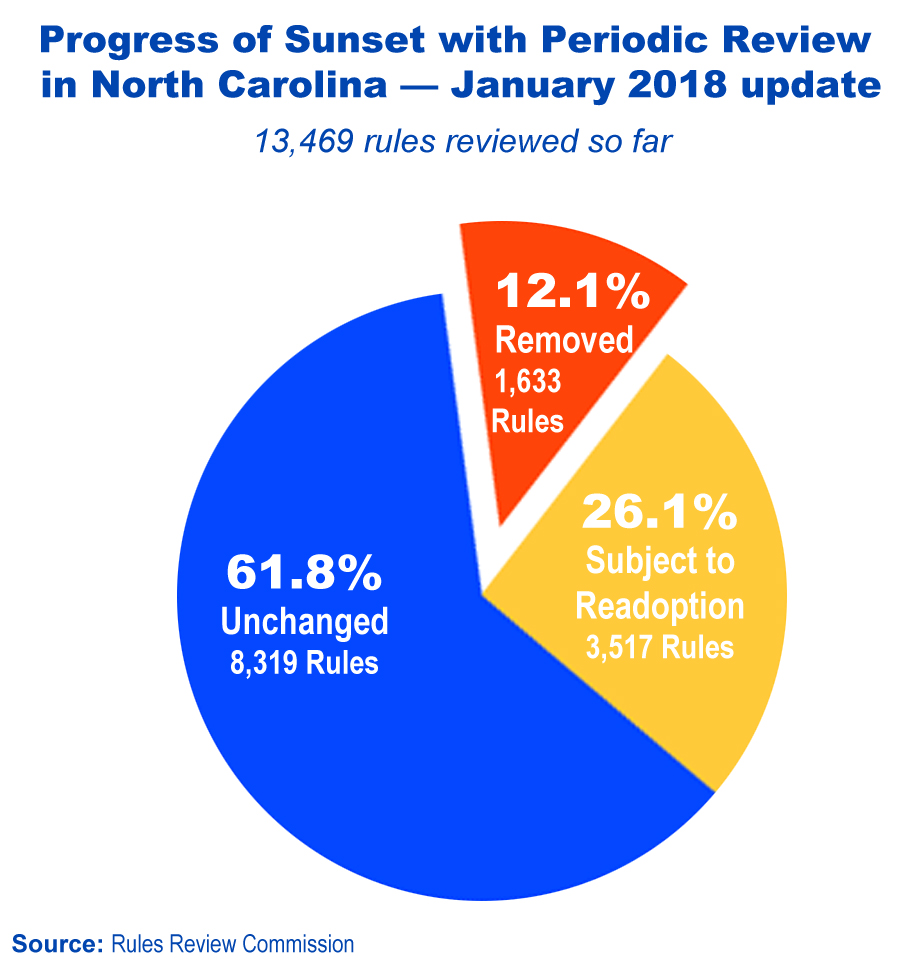Legislators have begun debate on this year’s regulatory reform bill, House Bill 374, the “Business Freedom Act.” The bill would be another welcome addition to red-tape reduction in North Carolina. Here’s a partial list of its proposed reforms:
- Reduce the cost and regulatory burden of hospital construction by replacing the state’s rules for constructing hospitals and outpatient facilities with guidelines developed by the American Society for Healthcare Engineering
- Let local governments’ franchise agreements with sanitary landfills last for the landfill’s life-of-site
- Relax the building code for parking garages in certain circumstances
- Exempt small pressure vessels from inspection and regulation under certain circumstances
- Extend wastewater system construction and improvement permits if they were granted from 2000–15, not yet acted upon, and in danger of expiring
- Prevent local governments from extending stormwater control rules to public airports
- Limit challenges to certain permitting and certification decisions by the Department of Environmental Quality (DEQ) and the Environmental Management Commission (EMC) to applicants and anyone who raised an issue during the public comment period that actually merited looking into
Regulatory reforms in North Carolina: over 1,000 items since 2011
In recent years the General Assembly under Republican control has pursued an annual regulatory reform agenda. Some of those reforms have been major, perhaps none more so than sunset provisions with periodic review from the Regulatory Reform Act of 2013.
 Many of those reforms, however, have been individual instances of relaxing regulatory strictures. Perhaps they would seem to be small and inconsequential, but over time each reduction in red tape frees up the economy to grow just a little faster and a little stronger.
Many of those reforms, however, have been individual instances of relaxing regulatory strictures. Perhaps they would seem to be small and inconsequential, but over time each reduction in red tape frees up the economy to grow just a little faster and a little stronger.
The regulatory reform bills since 2011 have been omnibus bills, full of these small reductions, and there have been other reforms beyond those bills, including budgets. According to statistics presented to the Carolina Partnership for Reform by Dr. Jeffrey Warren, research director for the North Carolina Policy Collaboratory at UNC-Chapel Hill, the tally of regulatory reforms since 2011 exceeds over 1,000 items.
The John Locke Foundation’s policy position on red tape reduction and regulatory reform explains why all that is important. Here’s a sample:
More lightly regulated industries grow much faster and produce at much greater rates than more regulated industries. Cutting red tape and keeping regulatory burdens light and up-to-date are important for economic growth — which means personal income growth, too. …
A 2015 study by economists at Beacon Hill Institute at Suffolk University estimated that state regulations cost North Carolina’s economy as much as $25.5 billion that year. That’s just for one year. But the regulatory slowdown goes on, year after year, like a car loaded down with bricks.
Red tape reduction helps reverse this slowdown and allows the state’s economy to quicken the pace of growth. Even incremental reforms add up over time. And there are still many broad areas of red-tape reduction waiting for a reform-minded champion to pass.


